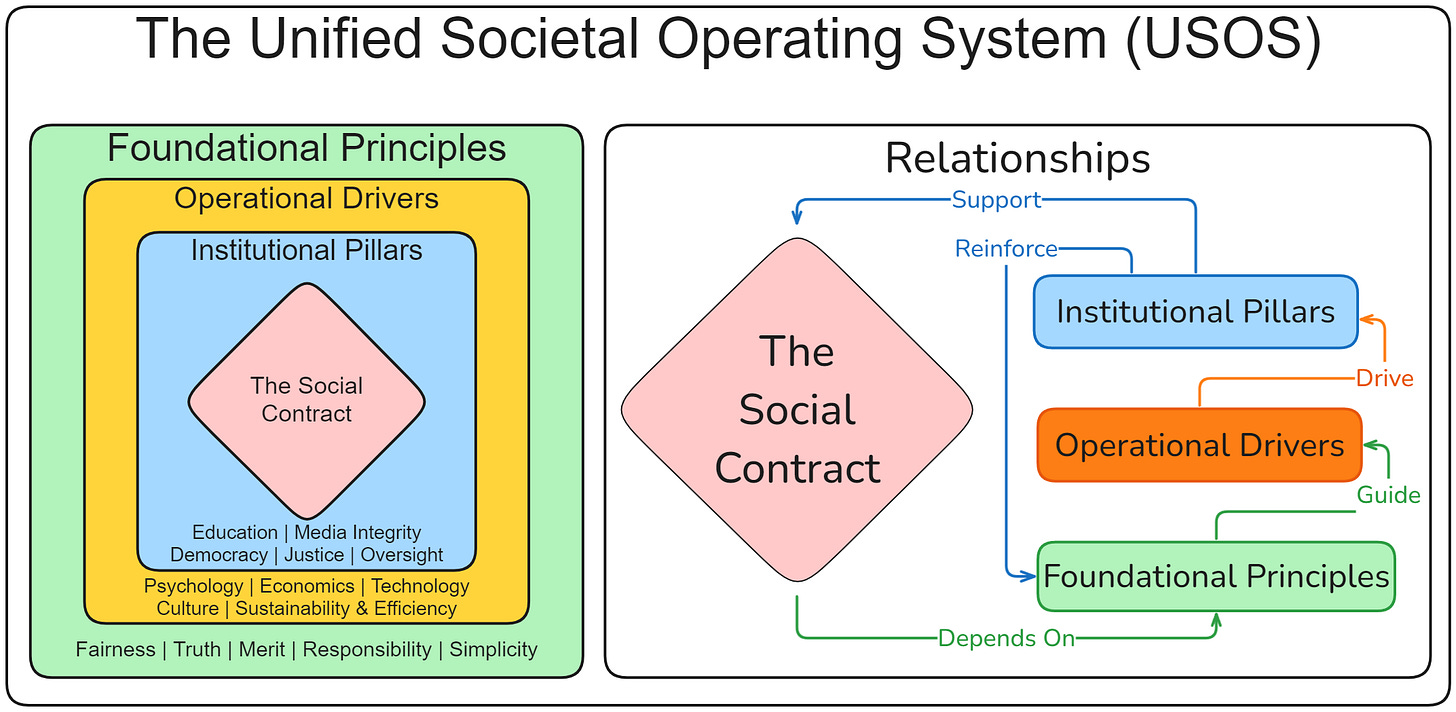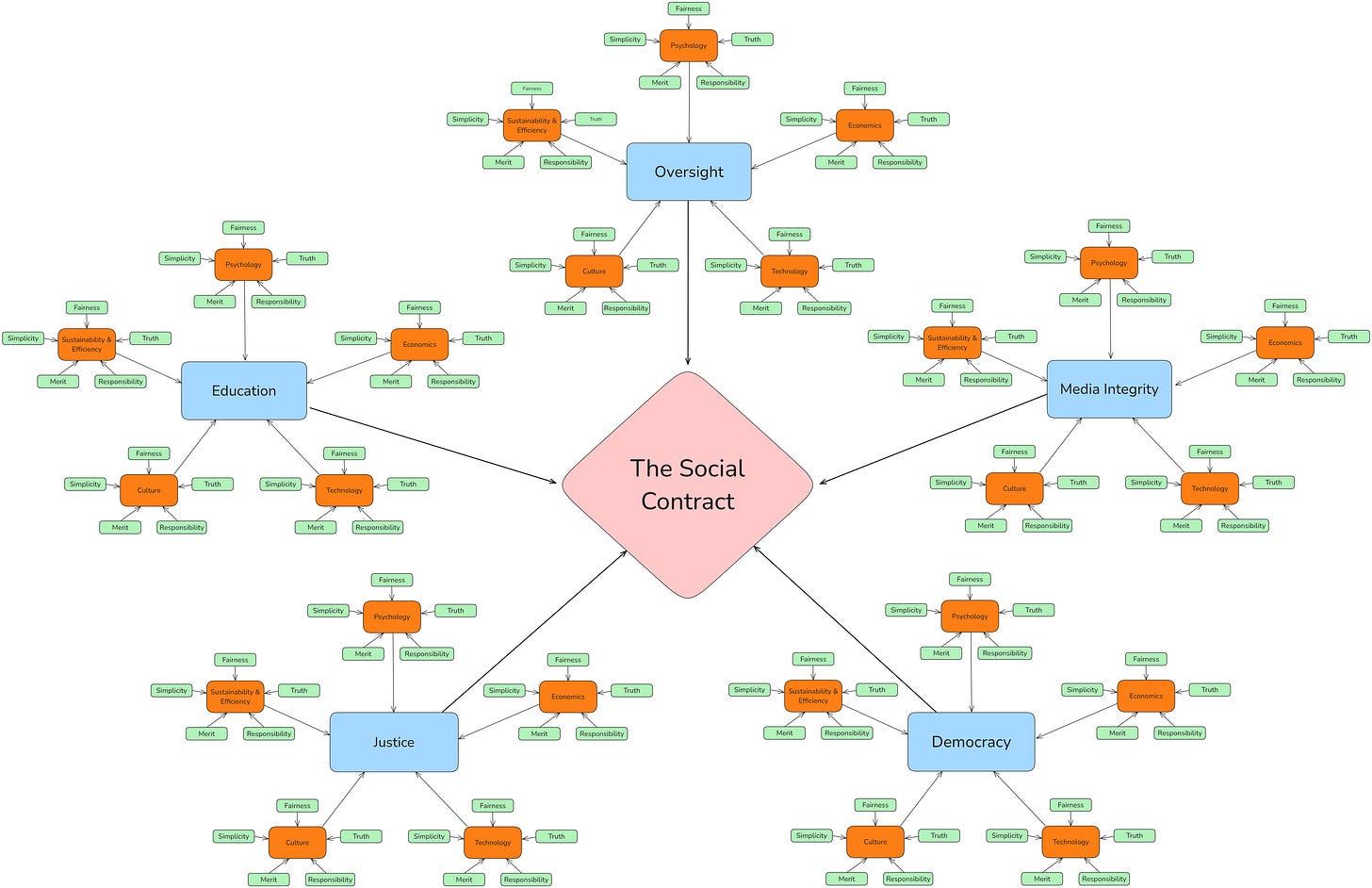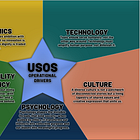The Unified Societal Operating System (USOS): A Framework for the Future
A Living Framework for Diagnosing Failures, Building Solutions, and Shaping a Better Society
Societies today face unprecedented challenges: growing inequality, polarization, and a pervasive distrust in institutions. In such a fragmented world, how can we realign our systems to foster equity, trust, and collective well-being? Enter the Unified Societal Operating System (USOS) — a transformative framework designed to guide societies toward sustainable and just futures.
USOS bridges gaps in governance, economics, culture, and sustainability by rooting all systems in timeless principles: Fairness, Truth, Responsibility, Merit, and Simplicity. It’s more than a set of ideals; it’s a comprehensive meta-framework for diagnosing societal failures and crafting practical, actionable solutions.
A Living Framework
USOS is not a static blueprint. It is a living framework, designed to evolve over time through questioning, refinement, and the active contributions of its community. Readers are encouraged to engage with this framework, providing feedback and ideas to help shape it into an even more robust guide for societal progress.
Over the Coming Weeks
I’ll dive deeper into each principle, driver, and pillar, building on this foundational post. Together, we’ll explore how USOS can address real-world issues and pave the way for a more equitable and cohesive society. Readers are encouraged to use Substack’s navigation to find detailed posts on each USOS element as they are published, making it easy to explore and understand each component in depth.
The Five Foundational Principles
The principles anchor USOS, ensuring ethical coherence and systemic alignment across all facets of governance and society:
Fairness: Every individual deserves equitable treatment, dignity, and access to opportunities. Fairness guarantees a baseline of justice while respecting individual capabilities.
Truth: Societal decisions must be grounded in evidence and logic, fostering a shared reality that builds trust and cohesion.
Responsibility: Individuals and institutions are accountable for their societal impact, contributing proportionally to societal well-being and rectifying harm caused.
Merit: Effort and contributions should be rewarded fairly, ensuring systems incentivize creativity, innovation, and progress while minimizing exploitation.
Simplicity: Overly complex systems breed inefficiency and mistrust. Simplicity ensures transparency, accessibility, and fairness in implementation.
Read more about the Foundational Principles:
The Five Operational Drivers
While the principles set the ethical foundation, the operational drivers translate them into action, addressing the practical dimensions of governance:
Psychology: Harnesses human behavior to promote collaboration, mitigate division, and align societal systems with innate tendencies.
Economics: Aligns resource distribution with fairness, innovation, and societal stability, balancing competition with robust safety nets.
Technology: Aligns advancements in all fields of science—including Artificial Intelligence—with the USOS so that technology becomes a tool for equitable, cohesive progress.
Culture: Celebrates diversity while fostering shared values and mutual respect, ensuring societal cohesion without erasing unique identities.
Sustainability & Efficiency: Optimizes resource use and ensures systems are resilient and adaptable to long-term challenges.
Read more about the Foundational Principles:
The Institutional Pillars
To operationalize the principles and drivers, USOS relies on five institutional pillars that provide structural oversight and governance:
Education: Cultivates informed, critical thinkers and lifelong learners, equipping individuals to engage meaningfully with society.
Media Integrity: Promotes transparency, accountability, and truth in public discourse, combating misinformation and fostering trust.
Democracy: Promotes fair participatory governance where only those aligned with USOS principles can represent others.
Justice: Upholds fairness and accountability through reformative systems that prioritize equity, transparency, and societal alignment.
Oversight: Monitors systemic alignment with USOS principles, providing transparency, public empowerment, and proactive course correction.
The USOS Framework Diagrams
Below are two diagrams illustrating the structure and relationships within the USOS framework:
The Layered Diagram:

The Interconnectedness Diagram:

Why USOS Matters
USOS is not just a theoretical framework; it is a practical guide for tackling today’s most pressing challenges, including:
Wealth Inequality: Establishing fair economic policies that balance opportunity with societal stability.
Media Misinformation: Ensuring truth and accountability in public discourse.
AI and Automation: Guiding technological advancements to benefit society equitably.
Justice Reform: Transitioning from punitive systems to reformative, equity-driven models.
Climate Sustainability: Prioritizing long-term resilience through efficient resource use.
By grounding societal systems in principles that transcend cultural and ideological divides, USOS provides a roadmap for shared progress and enduring stability.
Stay Tuned
Stay tuned for the following:
In-depth explorations of the USOS components.
Case studies analyzing historical and contemporary events through the USOS lens.
Practical applications of USOS to today’s biggest challenges.
News coverage highlighting how USOS principles apply to current events.
Join me on this journey and share your thoughts, questions, or feedback in the comments. Together, we can build a better roadmap for societal progress.






